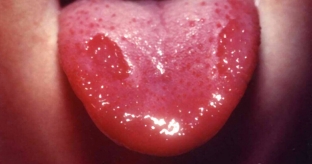Against the background of metabolic disorders, chronic pathologies of the nervous or digestive system, painful sensations may appear in the tongue without violating its integrity. This process is called glossalgia and is accompanied by a sensation of tingling, burning, tingling or soreness in the tongue. Sensations in the tongue are not associated with food intake or irritating effects of any factors. Glossalgia usually occurs after the age of 40, and in men several times more often. Why does the tongue hurt? Consider the main causes of glossalgia.
The main reasons for the presence of glossalgia in patients
Patients may associate sensations in the tongue with trauma to the oral cavity with foreign objects, fillings or prostheses. However, patients also note that glossalgia increases after disorders of the autonomic nervous system. Further, irritation of the nervous system is maintained at the level of nervously – reflex circuit, after which glossalgia is chronic. Since no organic causes of glossalgia have been identified, this disorder is functional in nature.
In suspicious patients, glossalgia develops in diseases of the peripheral nervous system, endocrine disorders, and also against the background of vascular disorders. Disorders of the nervous system, which are accompanied by a decrease in sensitivity or a misperception of the response to stimulation, also contribute to the development of glossalgia.
Based on numerous studies, glossalgia is recognized as one of the symptoms of viscero – reflex bulbar syndrome, which is accompanied by damage to the vagus and glossopharyngeal nerves. Therefore, a violation of innervation provokes false sensations in the absence of a traumatic factor.
The nature and localization of painful sensations in the tongue with glossalgia
Patients with typical glossalgia complain of a tingling, burning, and raw sensation in the tongue. What is the difference between patients with glossalgia in psychological status, read further on estet-portal.com. Such sensations can be either permanent or temporary. Some patients with glossalgia complain of constant dryness in the mouth, which increases during nervous tension or overwork.
Glossalgia can occur when you are nervous before an important conversation or public speaking. At the same time, eating helps to eliminate unpleasant sensations in the tongue.
Against this background, some patients develop bulimia and weight gain.
Characteristics of manifestations of glossalgia:
- The tingling and burning are most pronounced on the lateral surfaces of the tongue.
- There are no changes in the mucous membrane in the oral cavity.
- Some patients may have swelling of the tongue or plaque that appears due to dry mouth.
- Some tongue papillae may be hypertrophied.
- Instrumental examination reveals a decrease in pain sensitivity in the affected area and dystrophic changes in the salivary glands, which leads to hyposalivation.

What are the mental characteristics of patients with glossalgia?
Since glossalgia develops in patients with a labile nervous system, such patients attract attention with excessive excitability, suspiciousness, and anxiety. They are very attentive to trifles, delving into details about their condition. If the doctor asks to calm down, such a patient will become even more unbalanced and consider the doctor incompetent.
Patients with glossalgia are very afraid of any disease. In a conversation with such patients, it turns out that they have other neurotic pathologies. This is sleep disturbance, spastic colitis or cardialgia. Often patients with glossalgia refuse treatment of underlying diseases due to fear of medical manipulations and procedures. There are cases of erroneous diagnosis of the oncological process in the tongue against the background of the patient's incorrect story about sensations. Then the patient is referred to an oncologist, which further aggravates his condition.
Treatment of the underlying pathologies will eliminate all manifestations of glossalgia. It is important to correctly diagnose and convince the patient of the need for treatment.







Add a comment